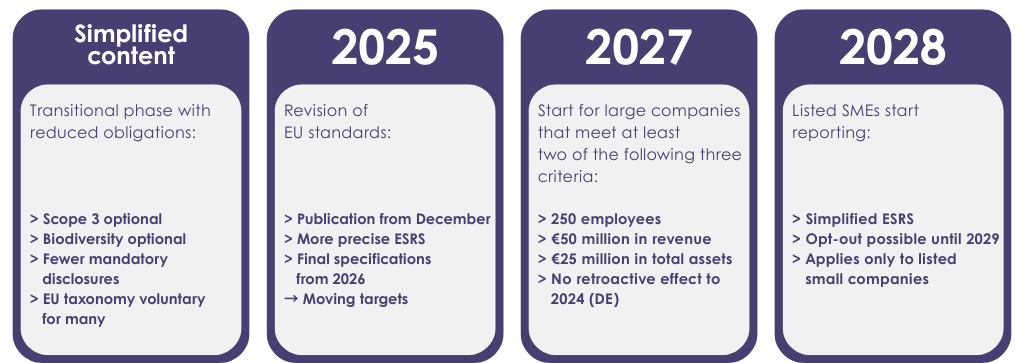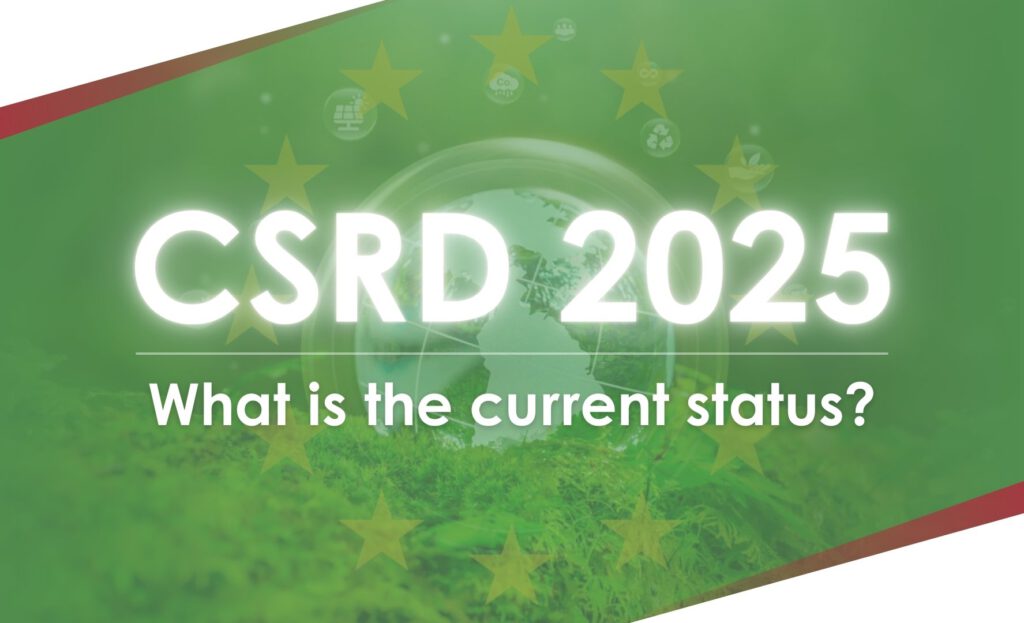Fall 2025: A CFO breathes a sigh of relief. The EU has postponed the dreaded sustainability reporting requirement (CSRD) for his company. Finally, there is more time, but is that really a reason to sit back and relax? Looking at companies these days, there is a mixture of relief and uncertainty. On the one hand, the EU has postponed the ESG reporting requirement for many companies – a postponement that allows CFOs and sustainability managers to breathe a sigh of relief for a moment.
On the other hand, the question remains: Does this solve the problem? The answer: Not at all. The sustainability reporting requirement has been postponed, but not canceled. On the contrary—now is the time to prepare. Because those who let the extra time slip by unused risk even greater turmoil in a few years.
What is currently changing with CSRD 2025 – explained in a nutshell
1. Reporting requirements postponed
The ESG reporting requirement for many companies has been postponed by two years.
- Large companies will now only start reporting on the 2026 financial year in 2027.
- Listed SMEs will follow suit from 2028.
- For groups already subject to reporting requirements, the retroactive effect to 2024 does not apply in Germany. In fact, much of this will only begin with the 2025 report.
2. Fewer companies affected
The threshold for reporting requirements is set to rise:
- In future, probably only from 1,000 employees (instead of 250)
- Plus €50 million in revenue or €25 million in total assets
- Up to 80% of the companies originally affected would no longer be required to report.
3. Simplified content
The EU is making it easier to get started with reporting:
- Fewer mandatory disclosures in the first few years
- Scope 3 emissions and biodiversity risks may still be omitted
- ESRS standards are currently being revised and streamlined
- EU taxonomy remains voluntary for many
Despite these adjustments, some questions remain unanswered. On the one hand, the final decision on the new scope (employee threshold, etc.) must be made in trilogue at EU level – probably in early 2026. On the other hand, the exact content of the revised ESRS standards will not be clear until December 2025. For companies, this means moving targets. But especially in this uncertain phase, it is important not to wait and see, but to act proactively. The time gained should be used wisely – because even a delayed starting signal will come at some point.
Conclusion: The hurdles are lowering – the pressure to act remains. Now is the right time to get started in a structured manner.
Would you like to know how to efficiently collect your CO₂ figures, systematically structure ESG data, or make your organization CSRD-ready? Then get in touch with us.

Why you should act now despite the CSRD postponement
1. Implementation requires lead time
CO₂ balances, ESG indicators, new processes—none of this can be established overnight. Starting early will help you avoid chaos shortly before the deadline.
2. Market pressure remains high
Customers, banks, and partners have long been demanding ESG data—even without a legal obligation to do so. Sustainability is becoming a business must-have.
3. ESG brings strategic advantages
Those who get started now will gain transparency, competitive advantages, and credibility. Early starters will benefit twice as much later on.
In short: the postponement is a gift—for everyone who takes advantage of it.
ESG consulting in practice: How BI2run supports you
Want to get your company ready for CSRD 2025? We can help you with exactly the right building blocks:
- CO₂ metrics & climate accounting
We help you systematically record Scope 1 to Scope 3 emissions and derive meaningful climate targets – data-based, validatable, reportable. - ESG data model & system integration
Together, we build your ESG data foundation: all relevant sources, structured metrics, automated workflows – audit-proof and efficient. - Report preparation & audit readiness
From materiality analysis to verifiable publication: we ensure that your sustainability report is not only ready on time, but also convincing.
You don’t have to do it alone. With us, ESG reporting becomes practical, clear, and future-proof.
👉 Talk to us now with no obligation and get your project off to a clean start.

Postponed is not canceled
The developments surrounding CSRD 2025 bring short-term relief for companies – but postponed is not canceled. In a few years, sustainability reporting will be part of everyday life for many, whether by law or market pressure. That’s why it’s worth acting now, despite the postponement. Those who make smart use of the current changes can approach the transition to ESG reporting strategically instead of having to react hectically. The benefits: more robust processes, better data quality, and a sustainability report that is not just a compliance exercise but creates real added value.
Our appeal to reporting officers, CFOs, and sustainability managers: view CSRD not just as a compliance issue, but as an opportunity. Take advantage of the (still) generous timeline to make your company sustainability-fit—with clear CO2 metrics, viable ESG targets, and a data model that will provide you with information at the touch of a button in the future. Experience shows that early action pays off. In the end, the companies that take sustainability seriously now and prepare professionally for the upcoming ESG reporting requirements will come out ahead.
The CSRD reporting requirement may have been postponed for many, but the pressure to act remains. Let’s make the most of it: with foresight, commitment, and the right partners at your side, the challenge of sustainability reporting can become a success story for your company. Acting now means actively shaping the future of your company—sustainably, transparently, and successfully.







